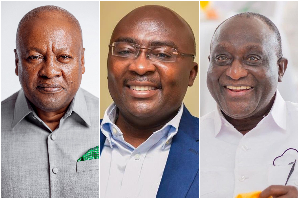 John Mahama, Dr Mahamudu Bawumia, and Alan Kyerematen
John Mahama, Dr Mahamudu Bawumia, and Alan Kyerematen
As Ghana approaches the 2024 presidential election, one fact is clear: it’s a three-horse race between former President John Dramani Mahama, Vice President Dr. Mahamudu Bawumia, and Alan Kyerematen, the former Trade and Industry Minister.
Each of these men has held significant power and responsibility in the country's governance, and in a serious nation, their track records would form the basis of their evaluation. But in this crucial moment, it is important for us, particularly the youth, to look beyond the political party they belong to and assess them based on what truly matters: competence, integrity, credibility, character, vision, and compassion.
For far too long, Ghanaian politics has been dominated by party loyalty, with the electorate largely voting along partisan lines. However, this has often come at the expense of national development. When politicians rise to power, their focus tends to shift toward consolidating their party's strength rather than prioritizing the country's progress.
This election provides the youth, who make up about 70% of the voting population, the chance to change that narrative. We must demand leadership that is rooted in building the nation, not just maintaining the party structure.
Each of the three main presidential contenders has had the opportunity to shape the nation's future through their roles. We cannot overlook how the economy fared under John Mahama’s presidency. Dr. Bawumia, as Vice President and the government's chief economic strategist, is closely tied to the current state of the economy.
Alan Kyerematen, as Trade and Industry Minister, introduced the One District, One Factory (1D1F) initiative, designed to transform local economies, and we cannot ignore its outcomes.
As young voters, it is vital to weigh the impact of their past actions on our future. While they may have policy proposals, it’s important to question whether they prioritize youth inclusion and national transformation. More importantly, the youth must look for the leader with the right policies to address both their immediate and future needs. Issues such as employment, skills development, housing, entrepreneurship, the cost of data, and the rising cost of living are of prime concern to young people.
Any candidate who fails to prioritize these pressing issues should not be voted for. We need policies that not only tackle today’s economic challenges but also create sustainable opportunities for the youth in the long term.
Competence, integrity, and vision are crucial, but they must be coupled with compassion. Ghana's leadership crisis has often been exacerbated by leaders who are out of touch with the everyday struggles of the people.
The youth of Ghana deserve a leader who not only understands their needs but is also driven by empathy, willing to bridge the gap between the government and the governed. Leadership isn’t just about policies - it’s about genuine concern for the well-being of the populace, particularly the future generation.
This election, therefore, isn’t just about who belongs to the NDC, NPP, or the Afrafranto Movement. It’s about who has the capacity and the will to lead Ghana into a brighter future.
The youth must take a stand, break free from political tribalism, and choose a leader whose track record, vision, and character align with the nation’s aspirations. This is our time, and the future of Ghana rests in our hands.